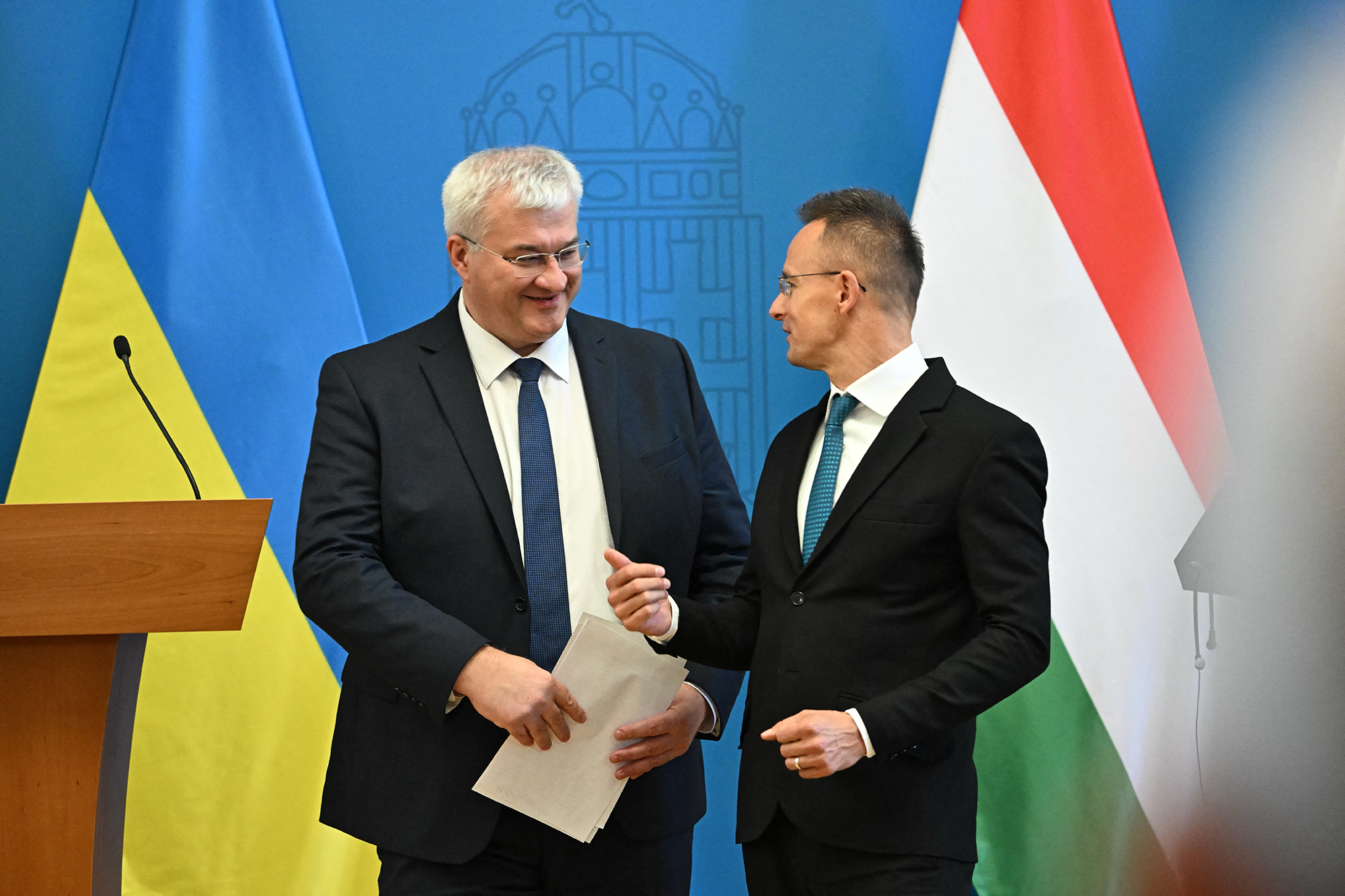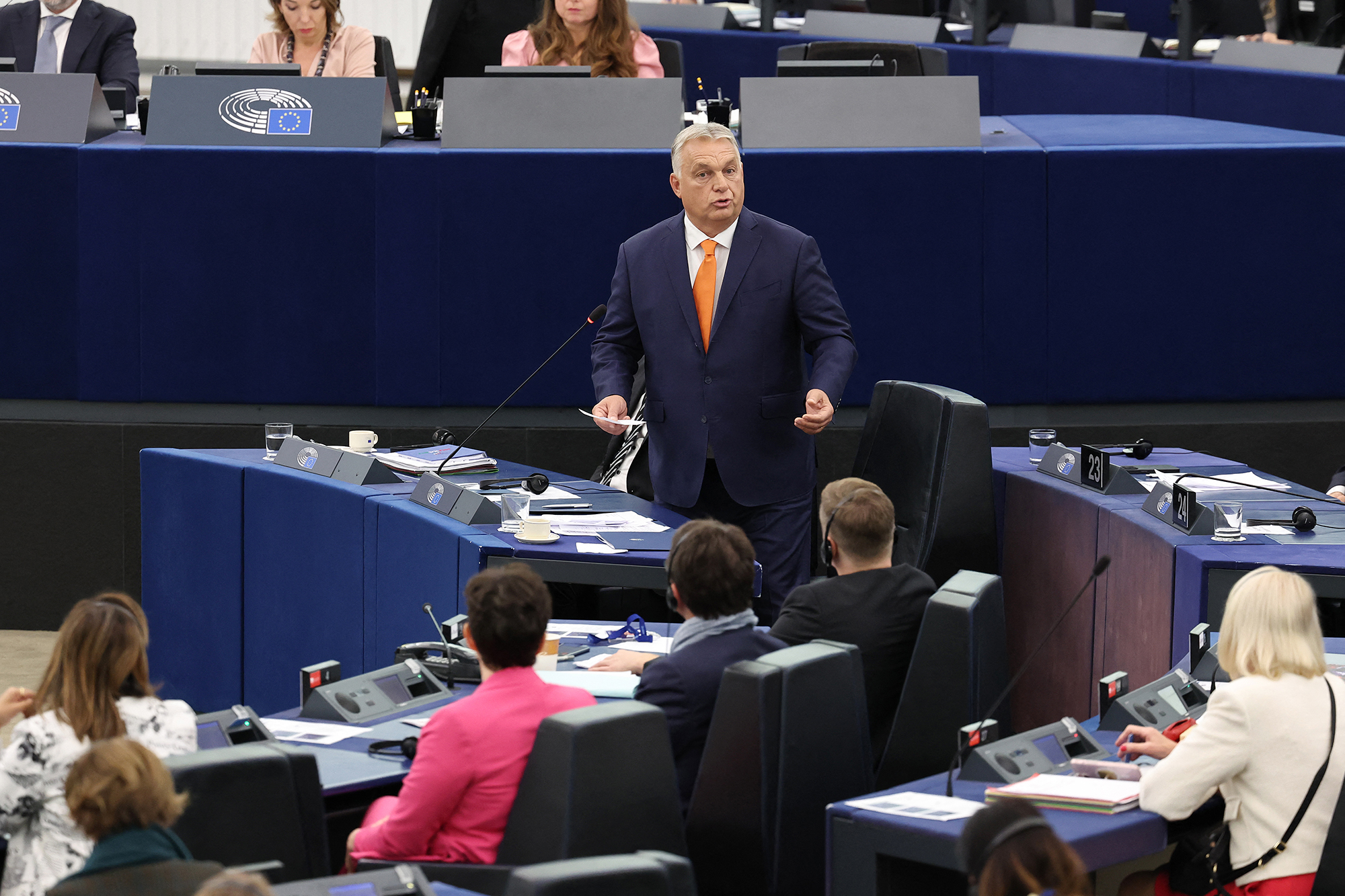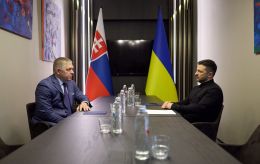Pragmatic friendship: Ukraine-Hungary relations and Orbán's fears
 Volodymyr Zelenskyy and Viktor Orbán (photo: RBC-Ukraine)
Volodymyr Zelenskyy and Viktor Orbán (photo: RBC-Ukraine)
How Ukraine aims to address problematic issues in its relations with Hungary, how the powerful Viktor Orbán suddenly found an unexpected political rival, and what leverage Kyiv and Budapest hold over each other read in the article by RBC-Ukraine.
Contents
- Ukraine-Hungary: Hint of understanding
- Opposition leader Magyar challenges Orbán
- Magyar and Ukraine
- Reaction to Magyar as a factor in Orbán's policy
- Hungary's leverage over Ukraine and vice versa
"Ukraine is a non-existent country," "defeating Russia is impossible," "Ukraine has lost its sovereignty," "Washington doesn't want peace" — such statements would typically be expected from any representative of the Russian regime or its propagandists. However, these words come from the leader of a country that is a genuine member of the European Union and NATO—Hungarian Prime Minister Viktor Orbán.
His subordinates are not lagging behind. Recently, Hungarian Foreign Minister Peter Szijjarto said that Ukraine's NATO membership could allegedly trigger the start of World War III.
Actions align with words. Even before the full-scale invasion, Hungary regularly put obstacles in Ukraine's path toward NATO membership. With the onset of the major war, as the importance of European unity for Kyiv increased manifold, Orbán's actions create even more problems, whether regarding the approval of another sanctions package against the aggressor country or the allocation of new aid packages to Ukraine or further steps toward Ukraine's integration into the EU and NATO.
For example, Budapest's stance has left €6.5 billion in aid to Ukraine from the European Peace Fund blocked for a year and a half.
However, despite this, recent hopes have emerged that relations between Ukraine and Hungary may become, if not warmer, then at least more constructive.
Ukraine-Hungary: Hint of understanding
On September 30, Ukrainian Foreign Minister Andriy Sybiha met in Budapest with his Hungarian counterpart Peter Szijjarto. Following the talks, both noted a "positive dynamic" in addressing issues concerning the Hungarian minority in Transcarpathia — a nominally key problem in bilateral relations.
According to RBC-Ukraine, during the negotiations, Ukraine presented Hungary with its proposals for normalizing relations. These proposals encompass not only the 11 points previously outlined by Viktor Orbán as an ultimatum. Recall that in June, Hungary laid out a series of demands related to language, education, political representation, and cultural rights of the Hungarian national minority in Transcarpathia in exchange for unblocking Ukraine's EU integration.

Andrii Sybiha and Peter Szijjarto in Budapest (photo: Getty Images)
Ukraine aims to finally implement the idea proposed by President Volodymyr Zelenskyy back in 2020 — to sign a basic memorandum with Hungary regarding historical and language matters. However, the current discussions involve a much broader range of issues, not in the format of a memorandum.
According to an informed source from RBC-Ukraine, Kyiv now wishes to build pragmatic and predictable relations with Hungary, similar to what has been achieved with the nearly as complex Slovakia.
Immediately after his appointment, Andrii Sybiha aimed to make his first official trip to Budapest. This was not possible due to scheduling issues, so he first visited Romania and Slovakia. Nonetheless, the fact that Budapest was among the first capitals he visited sends an important political signal.
Preliminary discussions indicate that RBC-Ukraine's sources express cautious optimism. At the same time, they recognize that internal challenges are brewing in Hungary that could, in the future, even call into question Orbán's hold on power and potentially shift his position on Ukraine, as has happened before.
Opposition leader Magyar challenges Orbán
Hungary has seen the emergence of a powerful rival to Orbán — Peter Magyar. As of mid-September, 39% of Hungarians expressed a preference for him if elections were held now, while 43% supported Viktor Orbán.
Importantly, Magyar's rising popularity has also benefited his party Respect and Freedom. The Hungarian name of the political force combines into the acronym TISZA, which is also the name of the river flowing through Ukraine and Hungary. The growth of Tisza's popularity has come at the expense of other opposition parties, none of which now surpass the electoral threshold, although several have small factions in the current parliament.
Magyar's party also finished second in the European Parliament elections in June this year, garnering nearly 30% of the votes, and he became a Member of the European Parliament.
Just recently, Peter Magyar was outside the political sphere. He previously worked in governmental institutions and was involved in Hungary's relations with the European Parliament, as well as being the husband of Hungary's Justice Minister Judith Varga.
However, in February this year, Hungary was rocked by a pedophilia scandal, leading to the resignation of Hungarian President Katalin Novak. It turned out that she had pardoned a man convicted of concealing pedophile crimes. The scandal hit Orbán's party, Fidesz, which promotes traditional family values. Consequently, the aforementioned Justice Minister also fell under scrutiny.
Meanwhile, her now-former husband launched a harsh critique of the government's actions and began his own political journey.
"Orbán is supported by exclusively a marginal, peasant part of Hungary. This primarily includes small, neglected towns in the northern and eastern parts of the country. The Hungarian elite concentrated in Budapest, with whom I spoke, 99% support Peter Magyar. They are very hostile towards Orban," says Tibor Tompa, head of the Hungarian community in Kyiv and the Kyiv region, to RBC-Ukraine.
The main core of Magyar's audience consists of intellectuals who have become disillusioned and fatigued by Orbán's autocratic rule, notes Vitalii Diachuk, an analyst at the Central European Strategy Institute and the Re:Open Ukraine project.
"This also includes those who were in some way involved in the state machinery but similarly desire change. Magyar represents a model for them, demonstrating that even a representative of the power system (albeit in a very broad sense) can step out from under its influence," says the expert.
Orbán has effectively established control over most Hungarian media. Thus, Magyar resorts to a favored tool in such cases—social media and the few remaining opposition media outlets that act as a counterbalance to pro-government outlets. According to Diachuk, these are few but popular among the intellectuals. Among the most well-known are Telex, 444.hu, 24.hu, and HVG, founded by journalists who left other media when Orbán's government began to exert pressure on them.
Magyar and Ukraine
"Currently, Peter Magyar has not made any loud statements regarding Ukraine. It seems that he first delved into events in Ukraine only during his visit to Kyiv, where he toured the Russian-bombed Okhmatdyt children's hospital," says Diachuk.
Just days after the attack on Okhmatdyt, the Hungarian opposition leader brought humanitarian aid to Kyiv. His party raised about 15 million forints in donations from Hungarians (approximately €38,000), as well as medicines, hygiene kits, and food supplies.

Peter Magyar in Kyiv (photo: Peter Magyar's Facebook)
Among other things, Magyar has sent political signals to his rival in this way. His trip took place just a week after Orbán visited Moscow, where he sought to discuss peace with Putin.
In any case, Magyar's political gestures should be viewed through the lens of Hungary's internal politics.
“Yes, he has said that he supports supplying weapons to Ukraine. However, that does not mean he is pro-Ukrainian. To be fully pro-Ukrainian in Hungary means losing elections, which the results of public opinion polls show regarding Hungarians' attitudes towards the situation here,” adds Diachuk.
In a recent interview with Euronews, Magyar commented on the Ukrainian issue rather evasively. According to him, Ukraine will neither win nor lose this war because of Hungary's position. Instead, he drew European media's attention to the presence of the Hungarian minority in Ukraine.
"Approximately 100,000 people still live there, and this issue is quite delicate. Fortunately, this region has never been attacked by the Russians, so we should be cautious about sending weapons or how to communicate in this situation," the politician said.
Another detail that may play a role in the future is his established relations with EU institutions, unlike Orbán, who has had a long-standing conflict with Brussels.
This was once again confirmed by Orbán's recent trip to Strasbourg, where he addressed the European Parliament as Hungary holds the EU presidency for the next six months. European lawmakers received him with hostility, ranging from harsh statements directed at Orbán to singing the anti-fascist song "Bella ciao" in the hall, alluding to the political orientation of the Hungarian Prime Minister. Most notably, Peter Magyar, who was present in the hall as a Member of the European Parliament, challenged Orbán by listing nearly all the failures and areas where Orbán's policies have collapsed within Hungary.
"Peter Magyar's goal is not only in Budapest and in the government. He is an international politician and is also competing for influence in the European Parliament, serving as a counterbalance to Orbán in relations with Brussels. Therefore, we should expect more support for him from Brussels. How significant that will be can be seen from the outcomes, for instance, regarding the Attorney General's request to suspend his parliamentary immunity," says Diachuk.
According to RBC-Ukraine, Kyiv is very cautious about dialogue with Magyar. Currently, any discussions may only be unofficial, as there is an understanding that Orbán's team closely monitors any such contacts.
Reaction to Magyar as a factor in Orbán's policy
Parliamentary elections in Hungary are not scheduled until 2026. Thus, Orbán has ample time to "neutralize" his rival. Similarly, Magyar is not delaying in strengthening his position and building up a political force, which currently does not have many members.
"Only now is he talking about the need to build a party and is working very actively in this direction. They plan to hold a party congress in the fall and announce a mass recruitment of members, primarily targeting youth," said Tibor Tompa, the head of the Hungarian community in Kyiv and the Kyiv region.
One can expect that Magyar will continue to criticize the shortcomings of Orbán's government and the Hungarian Prime Minister's inner circle.
In turn, the Hungarian Prime Minister publicly ignores Magyar, similar to how Putin long ignored Navalny in Russia. However, according to sources, Orbán's team is seriously anxious about the rising popularity of the opposition figure.

Viktor Orbán in the European Parliament (photo: Getty Images)
"As for the authorities' resistance to the new opposition force, we see the daily escalation of a smear campaign. Pro-government media are on the lookout for anything that could tarnish Magyar's reputation, both in his personal life and in public or professional matters. We have already seen scandals involving his family life, accusations of sexual harassment, and the ‘disco scandal,’ where he allegedly took someone's phone and threw it into the Danube," Diachuk explains.
Magyar's entourage is also under careful scrutiny from the Hungarian authorities, who are actively searching for potential involvement in corruption schemes, for example, concerning the vice president of his party, Márk Radnai.
Hungary's leverage over Ukraine and vice versa
In his struggle against Magyar, Orbán, as per his longstanding habit, diverts voters from internal issues through external activity. This has two dimensions.
The first pertains to his attempts to play at geopolitics and present himself as a mediator for peace between Ukraine and Russia. Recall that in July, after visiting Ukraine, Orbán went to Moscow, and Beijing, and even met with Donald Trump in the US, promoting his "peace plan".
After his visit to the US, it can be definitively stated that the Hungarian Prime Minister has gone all-in, placing his bet on Trump. In the context of Ukraine, this refers to his alignment with ideas regarding the conclusion of the war. Previously, Trump's circle indicated that one way to exert pressure on Kyiv could be to limit military aid to Ukraine.
On October 8, Hungary postponed its final decision on providing a €35 billion EU loan to Ukraine. This loan, agreed upon by the G7 countries in June, will be serviced through frozen assets of the Russian central bank in the West, amounting to about $300 billion. The European Union is ready to allocate up to €35 billion from these funds, with the remainder to come from the US and other G7 members. However, as in many similar situations, European leadership has effectively found a workaround to transfer funds to Ukraine.
The second dimension relates to Orbán's favorite tactic of seeking external enemies: from Soros and European bureaucrats to neighbors who allegedly infringe upon Hungarian minorities in Serbia, Romania, Ukraine, or other countries. However, a return to such rhetoric is likely possible closer to the parliamentary elections in 2026.
It must be acknowledged that Orbán currently holds significant sway in the context of European interests in Ukraine. This includes the ability to block EU accession within specific negotiation clusters, reverse energy supplies from Hungary, and influence the formation of the EU's mid-term budget, which needs to secure prospects for Ukraine's accession.
At the same time, the Ukrainian leadership has a powerful lever of influence over Hungary — the Druzhba pipeline, through which Russian oil is supplied to Hungary. In July, Ukraine demonstrated how this could work when it banned Russian Lukoil from transporting oil through Ukraine. In early September, a new agreement was reached whereby the Hungarian company Mol would take over oil supplies at the Belarusian-Ukrainian border.
Nonetheless, Ukraine retains the trump card of the Druzhba pipeline. Here, the situation is reminiscent of nuclear deterrence during the Cold War. According to informed sources, Ukraine can wield this leverage but prefers to reserve it as a last resort against Hungary.
Sources: public opinion polls, statements from Hungarian and Ukrainian politicians and diplomats, and comments from Tibor Tompa, head of the Hungarian community in Kyiv, and Vitalii Diachuk, an analyst at the Central European Strategy Institute and the Re:Open Ukraine project.

